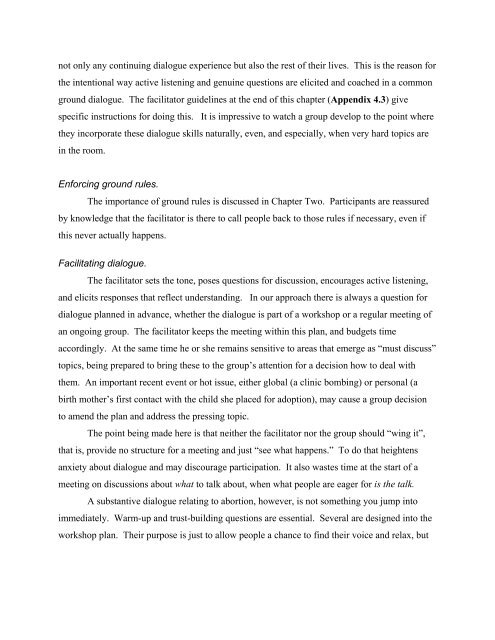The Common Ground Network for Life and Choice Manual
The Common Ground Network for Life and Choice Manual
The Common Ground Network for Life and Choice Manual
Create successful ePaper yourself
Turn your PDF publications into a flip-book with our unique Google optimized e-Paper software.
not only any continuing dialogue experience but also the rest of their lives. This is the reason <strong>for</strong><br />
the intentional way active listening <strong>and</strong> genuine questions are elicited <strong>and</strong> coached in a common<br />
ground dialogue. <strong>The</strong> facilitator guidelines at the end of this chapter (Appendix 4.3) give<br />
specific instructions <strong>for</strong> doing this. It is impressive to watch a group develop to the point where<br />
they incorporate these dialogue skills naturally, even, <strong>and</strong> especially, when very hard topics are<br />
in the room.<br />
En<strong>for</strong>cing ground rules.<br />
<strong>The</strong> importance of ground rules is discussed in Chapter Two. Participants are reassured<br />
by knowledge that the facilitator is there to call people back to those rules if necessary, even if<br />
this never actually happens.<br />
Facilitating dialogue.<br />
<strong>The</strong> facilitator sets the tone, poses questions <strong>for</strong> discussion, encourages active listening,<br />
<strong>and</strong> elicits responses that reflect underst<strong>and</strong>ing. In our approach there is always a question <strong>for</strong><br />
dialogue planned in advance, whether the dialogue is part of a workshop or a regular meeting of<br />
an ongoing group. <strong>The</strong> facilitator keeps the meeting within this plan, <strong>and</strong> budgets time<br />
accordingly. At the same time he or she remains sensitive to areas that emerge as “must discuss”<br />
topics, being prepared to bring these to the group’s attention <strong>for</strong> a decision how to deal with<br />
them. An important recent event or hot issue, either global (a clinic bombing) or personal (a<br />
birth mother’s first contact with the child she placed <strong>for</strong> adoption), may cause a group decision<br />
to amend the plan <strong>and</strong> address the pressing topic.<br />
<strong>The</strong> point being made here is that neither the facilitator nor the group should “wing it”,<br />
that is, provide no structure <strong>for</strong> a meeting <strong>and</strong> just “see what happens.” To do that heightens<br />
anxiety about dialogue <strong>and</strong> may discourage participation. It also wastes time at the start of a<br />
meeting on discussions about what to talk about, when what people are eager <strong>for</strong> is the talk.<br />
A substantive dialogue relating to abortion, however, is not something you jump into<br />
immediately. Warm-up <strong>and</strong> trust-building questions are essential. Several are designed into the<br />
workshop plan. <strong>The</strong>ir purpose is just to allow people a chance to find their voice <strong>and</strong> relax, but
















